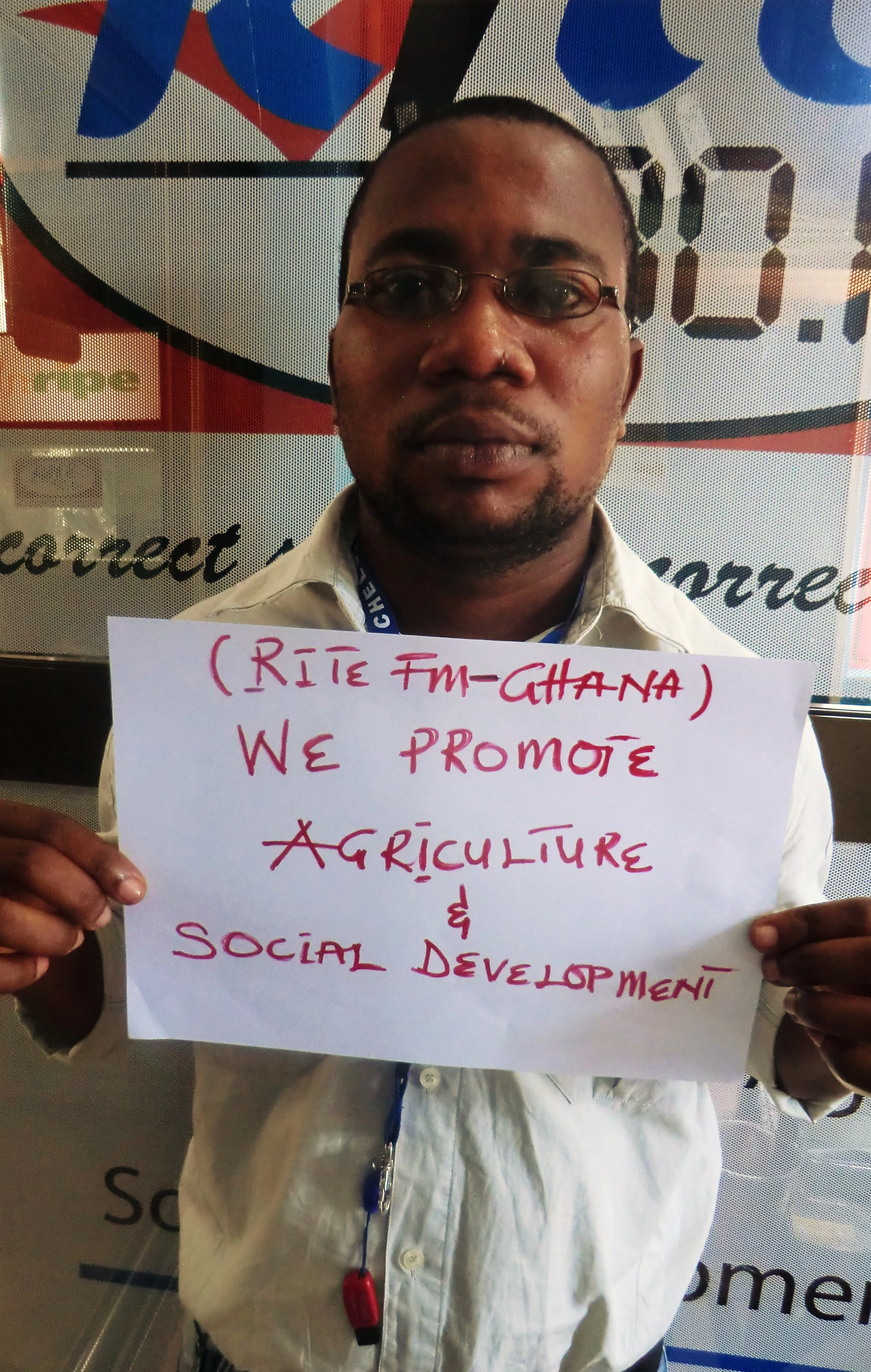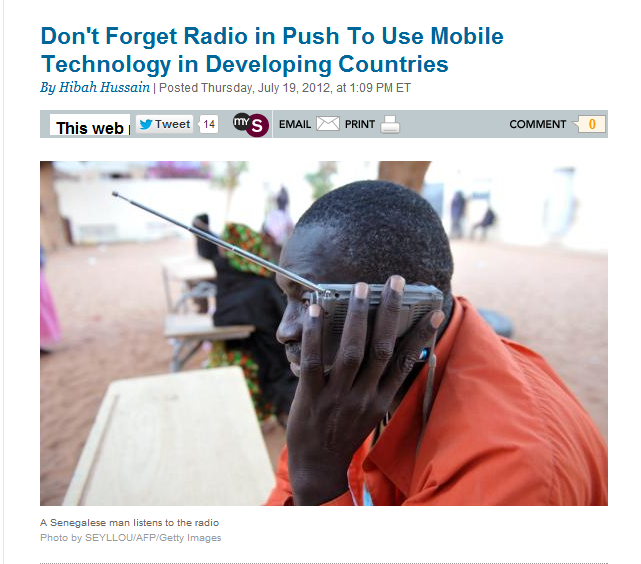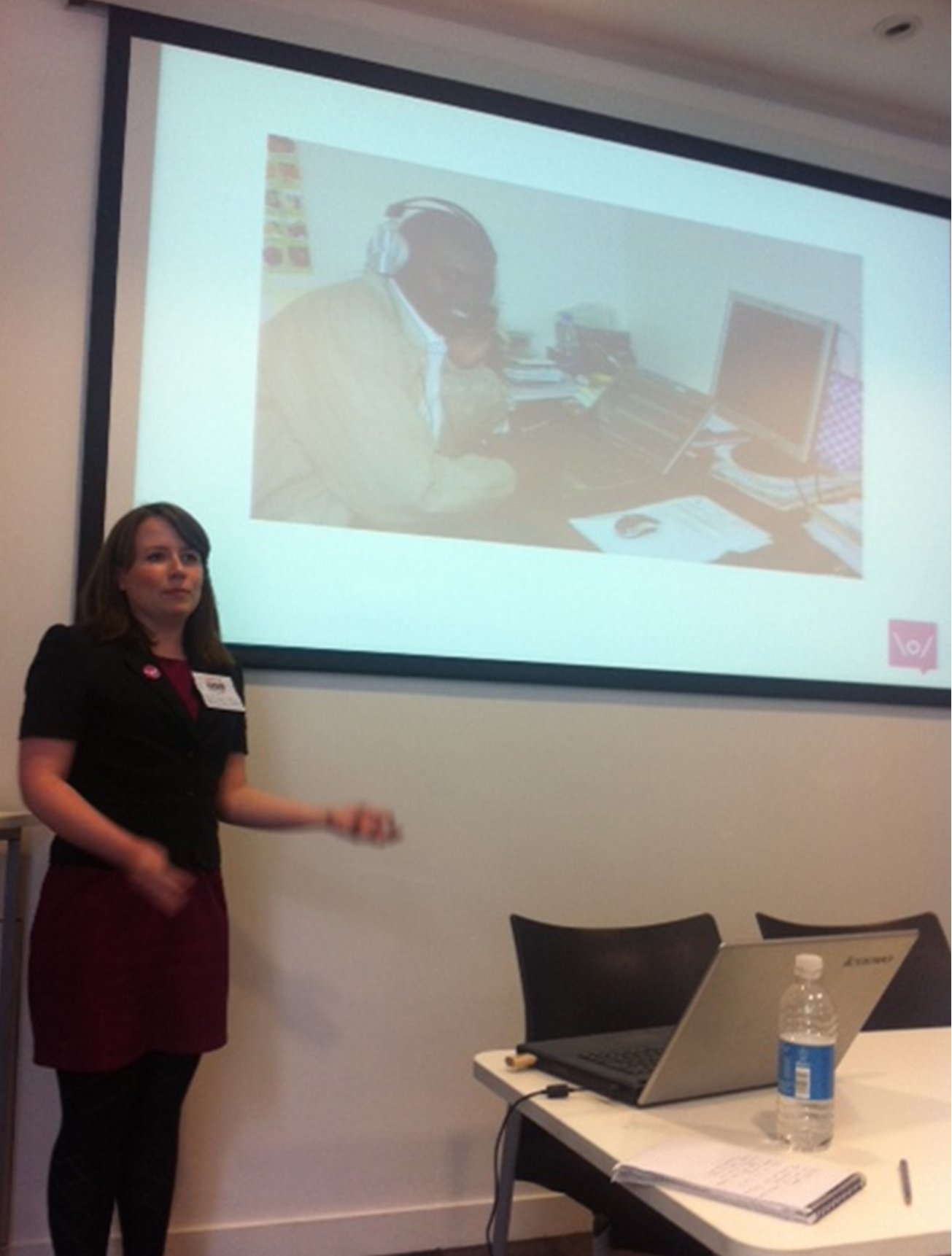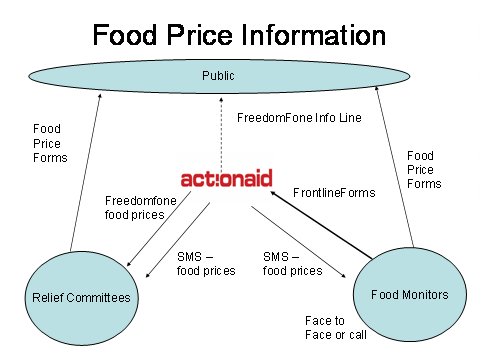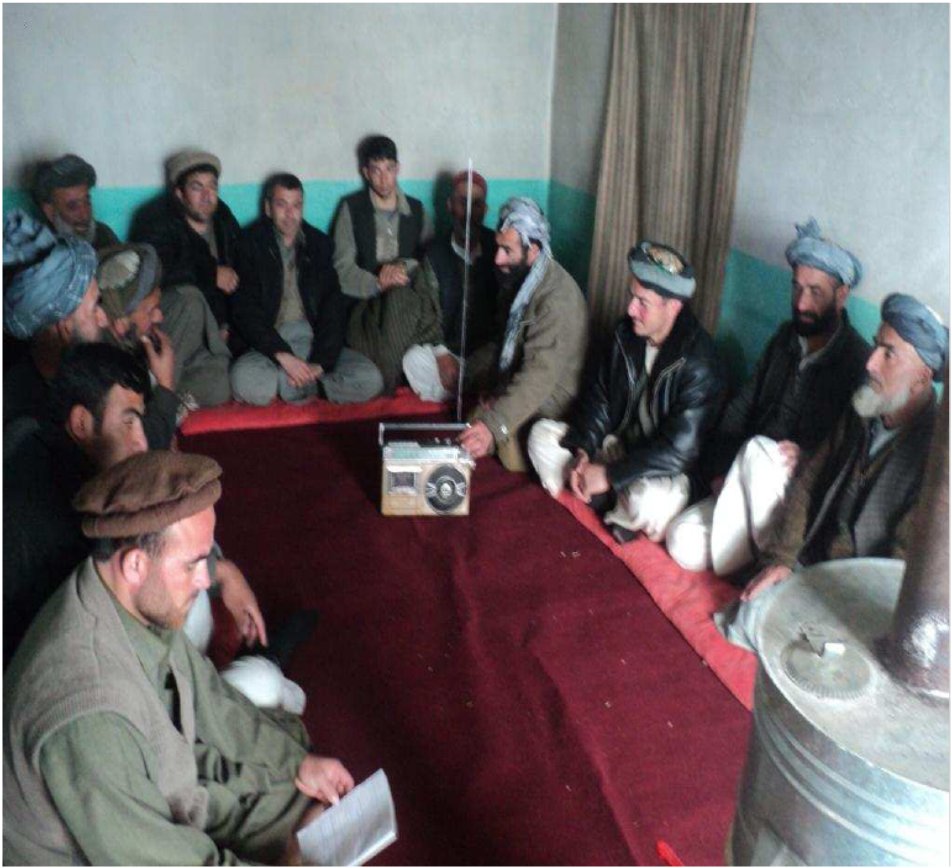Radio is the world's most powerful broadcast platform that unites communities. South Sudan’s Sawa Shabab (Together Youth) is one of many radio stations that use FrontlineSMS to provide entertainment, host community dialogue, and support targeted educational messages. The result is increase in listenership, positive impact of its educational goals and enhancement of peace and stability among the youth.
Now Showing: Africa's Voices
Coming to you from the University of Cambridge's Centre of Governance and Human Rights, we are pleased to feature a short film about the Africa's Voices project. This research pilot project supported local radio stations to use FrontlineSMS for audience participation, in an effort to continue to enhance citizen-based dialogue. Radio is still the killer app in Africa for sharing information. Adding mobile turns a one-to-many medium into a two-way interactive opportunity, empowering people to ask questions and hold their leaders to account.
Combining Local Radio and Mobile Phones to Promote Climate Stewardship
According to the report, with support from the Foundation to Promote Open Society, Developing Radio Partners (DRP) launched the one year pilot project, working with three local radio stations in each country. The primary aim of Zachilengedwe Tsogolo Lathu, as the participants named it ("Our Environment, Our Future"), was to empower rural Zambians and Malawians to address key climate change issues, especially local deforestation, by improving their access to information on the subject via radio and mobile phones.
FIRST Response Radio - Life Saving Information in Disaster
A big thank you to Mike Adams, the INTL Coordinator, for sharing his experiences with FrontlineSMS and further schooling us on how radio can facilitate in saving lives! In times of disaster radio not only saves lives, it can also bring hope and critical information to the affected community. When the 2004 tsunami struck Banda Aceh, Indonesia, all the radio and TV stations went off air. Similarly, during the 2005 South Asian earthquake, the only radio station near the epicentre lost its tower and went off air. In times like these, people are in desperate need of news and information on how to get to safety and how to survive. However, the unfortunate trend seen recently is that when radio is so important, many times it goes off the air and does not come back until well after the emergency is over.
How radio can be a conversation (not a lecture) and a jukebox (not a playlist)
Airtime is an awesome piece of software, built by Sourcefabric, which lets radio stations take control of programming via the web. It includes a simple scheduling calendar, smart playlists and automated playout. To mark World Radio Day 2013, FrontlineSMS:Radio's Amy O'Donnell wrote a post for Sourcefabric's blog on how this scheduling tool can be complemented by channels including SMS to help to make radio interactive. A snippet of the post is republished below, or you can read the original post in full here.
Star FM in Zimbabwe ensure Young People are the Stars
As with other community radio models, the Star FM community owns, manages and determines the content for programs – and in this case it is a community of young people. It is important for Bulawayo Youth Broadcasting to encourage youth participation because, as Philani explained, “They are the future leaders. The youth are encouraged to participate as they know that these issues affect them directly.”
“I am Loy, You are Loy”: A multimedia edu-tainment initiative engaging Cambodian youth in civic responsibility
I’ve been volunteering with the FrontlineSMS:Radio project and recently had the pleasure of speaking with Colin Spurway of BBC Media Action, an organization which helps people around the world to harness the media to promote change in their communities. Colin is the Project Director of Loy9(pronounced ‘Loy Pram-booun’), a multimedia initiative in Cambodia geared towards encouraging youth participation in civic life through the use of a television series, phone-in radio shows, online discussions and roadshows. We had a great discussion about the significance of the Loy9 initiative in promoting youth engagement in civic society through mobile technology, as well as some of the challenges.
FrontlineSMS at 7: Rite FM, Ghana
FrontlineSMS is coming up to 7 years old in October 2012 - seven years ago, our Founder Ken Banks made the first, prototype version available for download. We're celebrating this milestone by highlighting the people we work for - our wonderful users. That's you, folks. See a slideshow of our users showing off their work here.
To kick us off, our FrontlineSMS:Radio Project Manager, Amy O'Donnell, highlights one of the many radio stations using FrontlineSMS - Rite FM, in Ghana. You'll hear more from our team, including Ken, in the next four weeks, as we highlight more of the incredible work done by people using FrontlineSMS around the world.
Amy writes:
Rite 90.1 FM is a radio station in Ghana which focuses on agriculture and social development to inform and educate local farmers. They take the lead from their audience, using SMS, and make sure their shows are responsive and relevant to their community. This use case, for me, also shows how SMS participation empowers communities to seek information vital to their livelihoods.
The catchment area of Rite FM is diverse, with both rural and urban populations in the Eastern Region each having their own unique challenges, so it's important to make sure programming is participatory and responds to local needs. This is why presenters, including Ike Obufio (photo above) use FrontlineSMS to encourage listeners to share their farming experiences via SMS. The audience are invited to text in their opinion to polls on the major causes of food insecurity or add their voices to debates on industrialized farming techniques and genetically modified foods.
Using SMS allows Rite FM to dramatically increase the number of people who can contribute - there is high mobile penetration in Ghana and because SMS is digital there's virtually no limit to the number of votes in a poll, for example. One of the presenters, Asamoah, believes offering options in communication channels is very powerful. He says; “If you stick to only phone-in, you can’t progress. You can’t reach out to everybody." SMS also adds flexibility to incorporate free-form comments fluidly - as he points out: “Even when I’ve not gone on air, I can respond to you.”
You can get involved too:
Starting today, we're collecting photos of our users telling the world how they use FrontlineSMS. If you want to get in on the act, take a photo of yourself or your team holding a piece of paper or a whiteboard telling the world what you do with FrontlineSMS. For example: 'I monitor elections', 'I safeguard children' or 'I make art'. You can see a slideshow of the photos we've had so far on our Flickr page.
It doesn't matter what language it's in as long as it's legible and if possible you should be able to see from the photo where it was taken, so, if you can, get out of the office!
You can: - post to Twitter or Instagram with the hashtag #FrontlineSMSat7 - email the picture and we'll post them - post the picture on our Ning network and we'll post them - post them on Flickr or any other web service and let us know where they are
FrontlineSMS:Radio adds an Exciting Tool to the Mix at Rite FM, Ghana
Guest Post By Tully McLoughlin
By 6:30 in the morning Owuraku Asamoah is seated comfortably at the black microphone in the Rite FM studio in Ghana, headphones on, twin computer monitors glowing, a laptop by his side displaying his Facebook page, his cell phone gripped firmly in one hand. “And this is how we’ll start today’s edition of the Morning Ride, being produced by Nii Alarbi,” he begins. “Believe in your hearts that something wonderful is about to happen.”
Rite FM broadcasts on 90.1 FM and online at www.ritefmonline.org from the bustling, 20,000-resident town of Somanya in the Eastern Region of Ghana. It occupies a unique niche of the radio space here – a commercial station for agriculture and social development. It is not simply an outlet for agricultural extension, nor do its programs present the standard rigmarole of music, politics, and religion. The catchment area, which includes portions of the urban Greater Accra region and large swaths of rural area in the Eastern and Volta regions, symbolizes that dual-demographic challenge.
I’m volunteering my time at Rite FM. I met the director of the station through their close partnership with Farm Radio International, an NGO with whom I work. Farm Radio was started in the late 1970s by a Canadian agricultural broadcaster who saw the need for better farmer-focused radio in Africa. The organization has been supporting commercial, public, and community stations on the continent since then, and in 2007 undertook the 42-month “African Farm Radio Research Initiative” with the support of the Bill & Melinda Gates Foundation. Rite FM was one of five Ghanaian stations in the project.
My phone buzzes on the table by my bed, waking me up. “Tully. Owuraku wants you to talk about the Africa’s Voices project on the Morning Show in one minute.” That’s Kofi Baah, called Granpaa, the show’s producer. It’s July 20th, 7 am. Asamoah is devoting today’s show to a discussion of food security in Ghana, inspired by this month’s question for the project. The Africa’s Voices project is being undertaken jointly by the teams at FrontlineSMS:Radio and the Centre of Governance and Human Rights at Cambridge University UK, and Asamoah is taking the opportunity to cover the issue.
The question asks: “According to you, which is the bigger threat to food security in your area?” The options are: climate change, land access, market access, and food prices. I explain that by texting in their opinion they stand to win a remote-control, solar-powered, two-in-one lantern radio. A perfect way for farmers, in the field and off the grid, to tune in, the station’s director had told me the day before.
Asamoah takes calls and guides the conversation as it drifts from a debate on industrialized farming techniques to genetically modified foods. He is a pro at making the programming interactive. Beyond his demeanor, he has a number of tools at his disposal. There are two phone-in lines; an additional four lines on the Freedom Fone, an Interactive Voice Response tool; and an all-network SMS short code provided by the SIIMA system of SMS GH, a SMS-solutions company in Ghana. In addition, Rite FM operates its own website. And of course there is the battery of social outlets: a Facebook and user profile (ritefm), and a twitter feed (@rite901fm), and various satellite websites for other Rite FM projects. Now, the introduction of FrontlineSMS:Radio as part of the trial adds another exciting tool to the mix.
The advantage of this arsenal is that listeners participate and hosts facilitate in the way they’re most comfortable. Callers pepper the Morning Show, which runs from 6:30 to 9am, and The Drive, which runs from 2 to 5:30pm. But for shorter programs like Time With the CEO, profiling senior executives of agricultural businesses to showcase models of success and affluence along the agricultural value chain, and Women in Agriculture, focusing on the role of women as wives, mothers, traders, and entrepreneurs, the host may not be seeking a spread of opinions.
SMS, and to some extent Facebook or Twitter, give the host the flexibility to incorporate certain comments fluidly. That means, Asamoah points out, “Even when I’ve not gone on air, I can respond to you.” For listeners, says Nii Alarbi, a reporter and broadcaster for the Rite FM news team, SMS may be the only way they will contribute. “It’s not everybody who will like to call in for other listeners to hear his or her voice.” On a good day, a producer might expect to receive 10 or so texts in a show.
Even when the number of outlets to interact with listeners feels overwhelming, Asamoah sees that running in the opposite direction isn’t an option. “If you stick to only phone-in, you can’t progress. You can’t reach out to everybody.” Alarbi, who also hosts Herbs & Spices and the Agricultural Forum, says the day he does a show without taking any input, he will think, “Maybe I did it to my satisfaction, but I left my listeners behind.”
To find out more about Cambridge University's Centre of Governance and Human Rights "Africa's Voices" project click here and to learn about other projects using SMS with radio, visit FrontlineSMS:Radio's website.
Interview with European Journalism Centre Magazine: Is FrontlineSMS:Radio Advancing Social Change in Africa?
Amy O’Donnell, Radio Project Manager at FrontlineSMS:Radio recently spoke to Alessandra Bajec from the European Journalism Centre Magazine about the way FrontlineSMS is used to facilitate dynamic conversations between radio stations and their listeners in Africa and beyond. By enabling the powerful combination of radio broadcasting with SMS, FrontlineSMS:Radio is empowering and engaging communities across the globe. Republished here with permission or you can read the original post here. By Alessandra Bajec
Q. How has FrontlineSMS technology influenced African media?
Exponential growth in use of mobile technology has meant that many African media outlets are interested in using this technology effectively. By downloading FrontlineSMS and plugging in a mobile phone or GSM modem to a computer, people can use SMS in more sophisticated and professional ways.
We are moving from having contributions fed via SMS into an individual’s phone to a more open way of integrating SMS into content. We’re also supporting citizen journalists with tools for digital news gathering.
In Zambia, for example, Breeze FM radio uses FrontlineSMS to communicate with journalists. After gathering news tips received from the general public, the radio station organizes the evidence, sends SMS to journalists who may be out in the field, encouraging them to verify the facts and report.
Q. What is innovative about the FrontlineSMS software plugin?
With Version 2 recently released, FrontlineSMS has a user-friendly interface making it easier to manage larger volumes of messages, and to customize the software to better meet user needs. Pending messages can be sorted in a more timely fashion.
Slate.com features FrontlineSMS usage for a Radio station in Malawi
So radio is important—but not perfect. Although community radio stations often involve local residents in programming and long-term planning, getting real-time feedback from listeners can be challenging. Voice calls are expensive, and stations have a limited time to take calls from their audiences. This is where mobile telephony and text messaging can be a game changer, transforming radio listeners into active participants.Another example: FrontlineSMS, an organization devoted to leveraging mobile phones for development. Unlike similar organizations, Frontline has devoted significant resources to radio initiatives. Frontline’s platform has been used by community radio stations like Radio Mudzi Wathu in Malawi, which uses Frontline SMS to solicit questions, comments, and ideas from listeners. During prime listening hours, Radio Mudzi asks its audience questions like “why do you think that HIV/AIDS is increasing despite interventions?” and asks them to text their responses. They then aggregate the responses, analyze them, and take them to local policymakers and aid workers.
In addition to facilitating audience participation, SMS-oriented radio initiatives allow for unprecedented levels of audience research. After receiving feedback on any given issue, stations have a repository of information that they can analyze and look back on in order to better serve needs of audience. As they identify trends, needs, and concerns, radio stations can catalyze a profoundly fruitful cycle, using more relevant programming to drive audience engagement, thereby soliciting more feedback and dialogue.So how can we encourage more hybrid radio/mobile projects? First of all, we need to adjust the way we approach technology intended for the developing world. When designing, funding, researching, or discussing technology for development projects, we need to stop being fixated on one technology or platform and instead consider how new technology can be integrated with existing needs, values, and networks.
Context is King: Knowledge Sharing on Communications Tools at BBC Media Action
 By Amy O’Donnell, FrontlineSMS:Radio Manager
By Amy O’Donnell, FrontlineSMS:Radio Manager
Recently my colleague Flo and I visited BBC Media Action for a Knowledge Sharing session which focused on the use of innovative mobile technology to enable effective communication for social change. BBC Media Action (previously known as the World Service Trust) "uses media and communication to provide access to information and create platforms to enable some of the poorest people in the world to take part in community life. With a focus on programming that directly engages people in debate and discussion thereby encouraging communication across political, ethnic, religious and other divides in society." We felt lucky to be one of the last visitors to their longstanding home in the iconic Bush House, London as the BBC is relocating from there after 70 years.
Often when people first hear about FrontlineSMS, it’s not just the software which inspires them, but the valuable lessons we learn from how the tool is being used. BBC Media Action works to directly engage people in debate and discussion through programming and this workshop explored the potential of SMS to open up participation.
To broaden participation, combine accessible communications channels
We explored how a radio station in Uganda is using FrontlineSMS to gather incoming audience feedback via SMS to put their questions to MPs while on-air; how FrontlineSMS is engaging citizen journalists in Indonesia and how the software is being used to run a news service for women in Sri Lanka. Introducing another popular open-source platform, we explained how the Ushahidi mapping tool was used in conjunction with FrontlineSMS for election monitoring by the Reclaim Naija project in Nigeria last year to illustrate reports in relation to their location. Many of these programs use SMS in concert with other platforms, whether radio, TV or the Internet - an important element of building a truly accessible, system that works for its unique context.
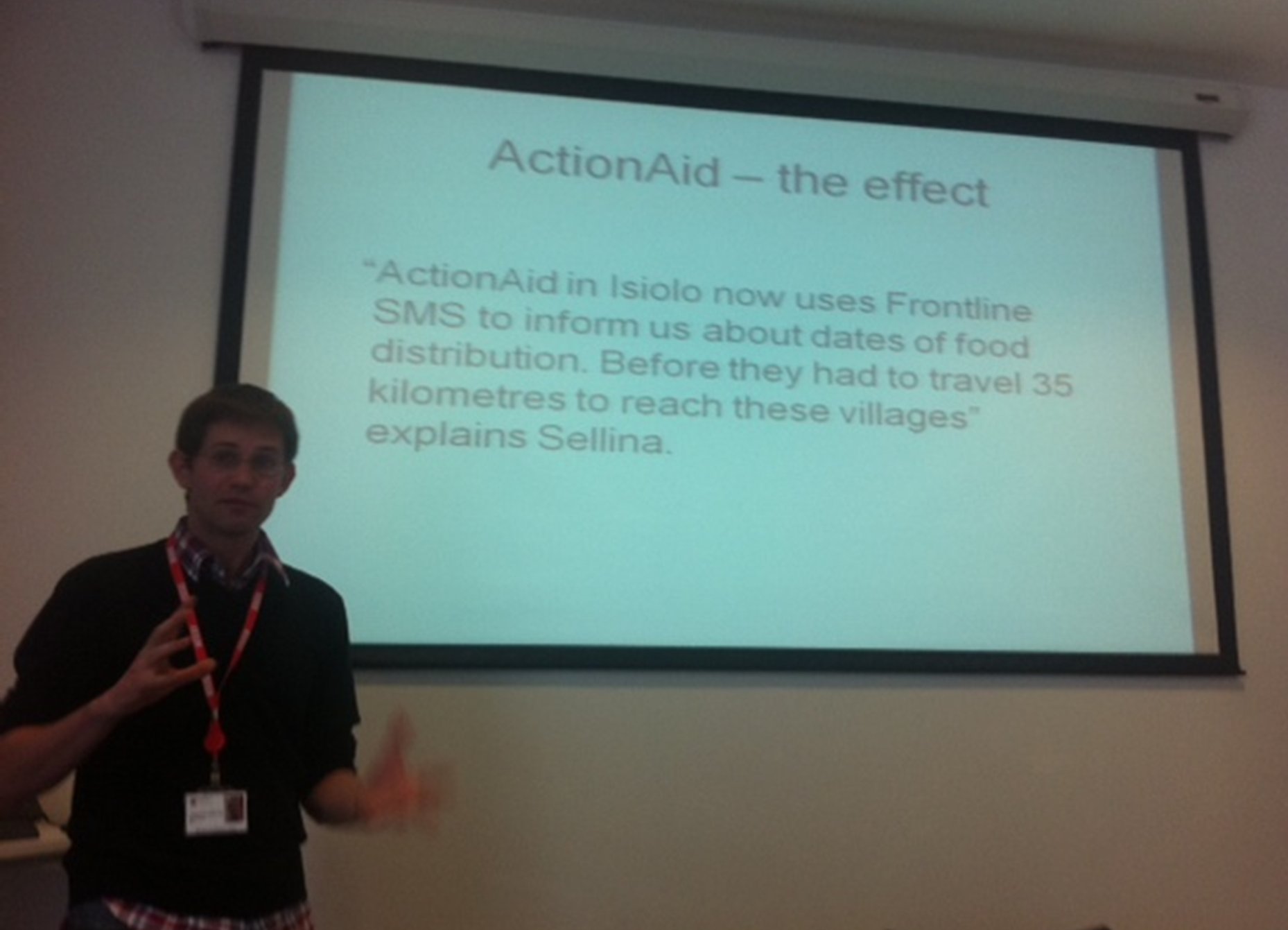
BBC Media Action’s own Jonathan Robertshaw shared his experience of using FrontlineSMS as a practitioner. He explained BBC Media Action’s role in a project run by ActionAid and infoasaid which which set up a food distribution alert and food price information system in Kenya in the aftermath of the 2011 drought. The project successfully took a multi-platform approach to improving communication between relief committees, food monitors and the public. The set-up gave people options, including voice (using an interactive voice-based software called FreedomFone); detailed SMS-based data collection (using FrontlineForms, FrontlineSMS’ data collection tool); and text message (using FrontlineSMS’s core platform).
Technology is 10% of the solution
As the discussion with different Media Action project leaders delved into program specifics, we explored how technology often only represents a small proportion of overall project design. Looking at potential Media Action projects - including participatory audio dramas and humanitarian radio - reinforced how important it is not to lose sight of behavioral and cultural factors as well as critical delivery planning: outreach, messaging, integration, translation, verification and impact monitoring. One of the group asked how to anticipate the resources required to run a communication platform. Particularly when the volume of response depends on the level of interactive behavior, the group agreed there is no “one-size-fits-all” or “magic formula.” Program staff have to consider the context and stay flexible, tweaking the system to respond to the needs of their beneficiaries and staff as they develop. Resourcing this kind of responsiveness is critical and difficult, and there are costs in money and goodwill involved in introducing people to a new system, changing messages and systems too often. The group agreed that, rather than committing to services which it may be difficult to estimate demand for, organizations should manage expectations and try to test ahead of time. Trying out communications in small trials or pilots can help scope people’s reactions.
The strongest message we took away from the session was practitioners’ motivation to learn about the different tools available in the communications toolkit. Often the design of a communication system is not about one tool, but the right tool or right combination of tools which suit the context. FrontlineSMS needs limited support and people are implementing projects all over the world using the software and tools readily available to them without requiring our team’s direct involvement. We're proud of how much that makes it a really sustainable piece of software for organizations working in the last mile, and a critical tool for long-term capacity-building.
'Know your leaders': Better FM, Uganda offers forum for listeners to interact with MPs
The team at Better FM, a radio station in Fort Portal, Uganda, were the most recent testers to install FrontlineSMS:Radio as part of the ongoing trial. Florence Brisset-Foucault, a researcher for the Centre of Governance and Human Rights (CGHR) at Cambridge University in the UK, is currently in Uganda, and helped with the installation, saying “I'm excited to report that it is running perfectly!” Here, Florence shares some updates from the station and the way they engage MPs in dialogues with listeners about public service delivery. By Dr Florence Brisset-Foucault
Better FM was created in 2008. Despite the fact it's a relatively new station here at Fort Portal, it seems very successful in terms of audience and reach. It has a high degree of response from local politicians, who are keen to engage with local citizens and hear their feedback. Honourable Alex Ruhunda, Member of Parliament for Fort Portal Municipality, District councillors and Tooro Kingdom officials regularly frequent the studios. Better FM has several programmes which focus on ensuring more transparency and accountability on public service delivery, especially concerning procurements and the building of infrastructure, particularly road, electricity and water.
One programme is called 'Know your leaders' which offers an opportunity for listeners to interact with their community’s decision makers. Another is called the ‘Listeners’ Forum’ and is sponsored by a local organisation called Tooro Development Network who specialize in empowering grass root organizations with ICTs and promoting transparency. Both shows are hosted by Better FM presenter Wilfred Mukonyezi, and have a heavy emphasis on being interactive with the community. Wilfred takes around 10 calls during each show and usually receives around 50 SMS, some of which are read on air.
For the past two weeks the station had a technical problem with their internet provider meaning they were not able to receive text messages. On 19th April, we installed FrontlineSMS:Radio – which does not rely on internet connection - on the studio's computer, and Wilfred was really excited.
We played with the software for an hour in order to get more familiar with it; sending text messages and testing functionality by creating imaginary polls. Wilfred immediately created "shows" for all his colleagues, a functionality in FrontlineSMS:Radio which allowed him to set up a space for each presenter to manage SMS relevant to them within the same system. After two weeks without SMS, Wilfred is glad he won't have to depend on the internet to receive messages any more. He said "All my workmates will enjoy this software! It's cheaper, it's easier, and [unlike relying on an internet connection] it doesn't give me a headache!"
To find out more about FrontlineSMS:Radio click here
To find out more about the research of Cambridge Centre for Governance and Human Rights click here. Find out about the Africa's Voices project as part of CGHR research on their website or join the conversation on Facebook
To read a recent update on the trial and research in Uganda and Zambia click here
“We are local. We live and love Cambridge.” An Innovative SMS setup at a UK Community Radio
By Peter Westman, FrontlineSMS:Radio Intern
Whilst FrontlineSMS is well known for being used in low infrastructure environments with little or no internet access and limited smart phone availability amongst audiences, we often hear cases of the software being used in contexts to complement many other technology options available. While Amy and I were in Cambridge in the UK a few weeks ago visiting colleagues at Cambridge University’s Centre of Governance and Human Rights, we also had the pleasure of dropping in to visit Cambridge 105, a community radio that broadcasts live across the city 7 days a week.
The station is a not-for-profit organization that draws on its wide range of volunteer members for all aspects of production throughout the day. Cambridge 105 actively uses social media tools such as Twitter and Facebook as part of their audience engagement strategy. They are also using FrontlineSMS in a very innovative way in order to help listeners interact with the presenters using text message.
Audience participation is popular at Cambridge 105, particularly during the breakfast and drive-time shows. Axel Minet (photo right), who works at the station, described how one of the most powerful appeals of Cambridge 105 is that the issues discussed are locally relevant and personal to the community. The station’s leaflets even say: “We are local. We live and love Cambridge.” The station has shows which are particularly popular with their Cambridge listeners, share local news and even once helped a local pet owner to find a lost cat.
Listeners are often invited to request songs and dedications via text message which are relayed to the relevant DJ. Using the FrontlineSMS as a “back end” (i.e. DJs do not need to directly enter the application), Cambridge 105 have designed a unique system in order to ensure messages reach the appropriate DJ. They have developed a customized PHP script, which is used to create dynamic web-based content. This is synchronized with Google Calendar containing the DJ schedule. When an SMS reaches FrontlineSMS, a query based on the message’s time stamp is sent to the calendar which works out the corresponding e-mail of the DJ who is on air. The message is then forwarded to the DJ in their email account using a http trigger and presenters can access the content from the studio computer while they are presenting.
By widely publicizing the contact number for the station, the station is also looking to increase participation from audiences, particularly so that those without smart phones (about half of the UK) can contribute to their favorite shows while on the move. Axel pointed out the notices displayed in the DJ booth and around the station, which explain how audiences can contact the show. These notices serve as a reminder for DJs that they must remind audiences of ways they can participate and interact, and Axel stressed the importance of repeating the number throughout the show (not just the beginning and end).
It is especially important for community stations to be able to learn about their audience so that they can tailor their programming towards their listeners’ concerns. The station manager at Cambridge 105 is interested in analytics around interaction. Being a digital form of communication, SMS is a great way to monitor this and offer metrics to advertisers. Advertising is important for the survival of Cambridge 105 who offer local sponsorship packages targeted to a potential audience of 150,000 Cambridge based customers, making it an effective marketing medium. Moreover audiences don’t feel advertising is an invasion as messages more likely to be targeted to their local needs.
Axel observed that FrontlineSMS software offers both a flexible back end which can be customized for their specific needs, while also permitting presenters to collect useful feedback and information from their audience in a simple and unobtrusive format. You can find Cambridge 105 at and even listen online.
If you’re using Frontline as part of your programming, we’d love to hear from you on radio@frontlinesms.com
Engaging Afghan Radio Audiences through SMS
 We recently spoke with Dr.Mohammad Anwar Jamili, Faheem Azami and Gordon Shettle from Equal Access, who are working on a project with 30 FM radio stations in Afghanistan to explore how FrontlineSMS can be used to enhance radio programming and engage local communities in discussions on social change. Equal Access specializes in communications combining the power of media with community mobilization, and interest was sparked amongst our community following a recent blog post introducing another of their radio projects in Chad and Niger, Africa. The focus in this post on Equal Access’ work in Afghanistan demonstrates a rich diversity in approaches to using FrontlineSMS in combination with radio, and shows the unique solutions set up by different projects around the world.
We recently spoke with Dr.Mohammad Anwar Jamili, Faheem Azami and Gordon Shettle from Equal Access, who are working on a project with 30 FM radio stations in Afghanistan to explore how FrontlineSMS can be used to enhance radio programming and engage local communities in discussions on social change. Equal Access specializes in communications combining the power of media with community mobilization, and interest was sparked amongst our community following a recent blog post introducing another of their radio projects in Chad and Niger, Africa. The focus in this post on Equal Access’ work in Afghanistan demonstrates a rich diversity in approaches to using FrontlineSMS in combination with radio, and shows the unique solutions set up by different projects around the world.
After 30 years of war which began in the 1980s, the communications infrastructure in Afghanistan was virtually destroyed, and the country’s natural geographic and cultural isolation prevented marginalized groups from receiving critical information. Following disruption caused by war, the country has recently begun to see improvements in many sectors; media being one of them. In the space of the last 10 years, radio stations in Afghanistan have grown from just one to 170 and there are now 50 TV stations. This speedy growth, however, has also brought problems as services have emerged which lack some capacity and professionalism. Equal Access is working in Afghanistan to close this gap in radio stations to empower them with new skills and assist them to harness technology. Equal Access has been based in Kabul since 2002 working with 30 FM stations throughout Afghanistan. They have estimated their reach across various networks of broadcast networks through both local FMs, and national broadcasters with regional repeaters to be approximately 10 million. This wide reach is down to the access of the communications channels they are utilising; though most families will not have TV, almost all families in Afghanistan will have access to a radio and a phone.
On Equal Access shows, radio presenters regularly ask a question to their audience and invite SMS feedback by announcing a number whilst on-air. Topics which are covered range from human rights and women’s issues, Islamic education, health and hygiene, drug demand reduction, elections and civic participation, rule of law and peace building. Most recently Equal Access got a lot of SMS feedback from a drama series that was produced for a media development project. The aim was to raise the awareness of the purpose of journalism, and some of the challenges that journalists face. Each program got up to 100 text messages per episode, and FrontlineSMS has proved to be a useful tool to manage the incoming text messages. Gordon Shettle who is working on the project for Equal Access says “SMS has provided us with a window into the listener who has the interest to interact with a program; it allows us to see what issues people are most expressive about.” Use of SMS by the radio stations allows listeners to send in short answers in Pashto and Dari using the Persian script, facilitating grass roots engagement and community participation. Literacy in Afghanistan is very low - the national illiteracy rate in some areas is over 70% and locally produced radio programs have proved to be an effective way to educate and engage communities. If presenters get particularly interesting feedback via SMS they’ll often arrange a call back so speak to individuals on the show. Contributors are also added to contacts records and groups to assist with communication over time.
While some listeners reply to a topic as soon as they hear it, some reply with messages later in the day – or even week - so it is a challenge for Equal Access to identify which episode messages are related to. Using keyword automation functionality in FrontlineSMS can help with this, and this is something which the new FrontlineSMS:Radio software has been designed to assist with. The team have found they have higher response rates if they carry out a draw or competition, and interaction seems to be particularly popular amongst youth groups. Another factor that it’s important to consider is cost. For example, many to text a local number in order to keep costs down, or better, arrange for a toll-free SMS number. Gordon also explained another aspect relating to cost and sustainability, “We encourage SMS as a tool for radio stations to get to know their audience, and build its base of followers. It can be a path to sustainability if they consider using SMS for advertising or marketing, should they want to appeal to local businesses.” Furthermore, other FrontlineSMS functionality helps Equal Access to maintain a sustainable funding. Stations often export text messages to excel for monitoring and evaluation purposes, which can be done using FrontlineSMS. This offers invaluable information for reports and analysis, as well as to feed back to donors. The aim of Equal Access’ project is to build capacity of stations so they can encourage stations to start their own interactions. By conducting training, the team wants to ensure tools like FrontlineSMS are made accessible to stations to run themselves. Anwar Jamili explained: “One of our responsibilities is to provide responsibility to local FM stations- responsibility for their own community besides profit making. I believe that radio can play an increasingly more important role in bringing together communities and government and our program will help them to be more interactive with their audience using SMS. This provides them with the opportunity to produce what their audiences want.”
To stay updated on Equal Access’ work in Afghanistan and in other contexts visit their website.
To stay updated on FrontlineSMS:Radio software development keep an eye on the FrontlineSMS:Radio blog.








